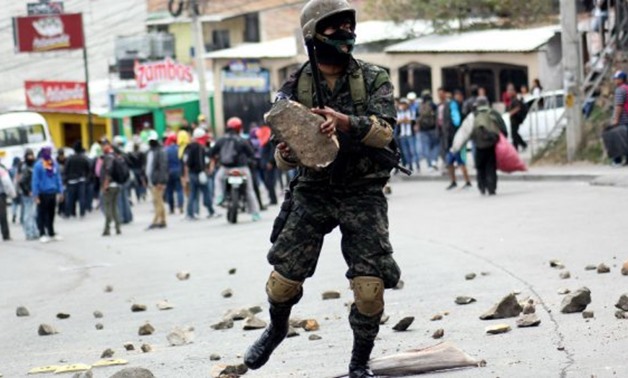
Stringer, AFP | A soldier removes stones after clashes with supporters of the Honduran Opposition Alliance Against the Dictatorship in Tegucigalpa on January 20, 2018.
22 January 2018: Activists blocked roads and clashed with police in Honduras on Saturday as part of nationwide protests against the contested re-election of President Juan Orlando Hernandez.
Dozens of people have been killed and hundreds jailed since Hernandez was declared the winner of the November 26 run-off election -- after a three week stretch of often-interrupted ballot counting that stoked tensions and sparked accusations of fraud in the Central American country.
The left-wing Alliance in Opposition against the Dictatorship is heading a protest campaign insisting that the election was stolen from its candidate, former TV anchor Salvador Nasrallah.
The opposition called for a "national strike" on Saturday to block the country's main roads ahead of the start of the president's new term in office on January 27.
The government deployed police and soldiers to confront protesters.
One demonstrator was shot dead Saturday, opposition leader and former president Manuel Zelaya told AFP, identifying the victim as Anselmo Villareal, 60.
Seven other demonstrators were detained and two police were hurt, police spokesman Jair Meza said.
A military spokesman, Lieutenant Jose Coello, told AFP that some highways had been blocked "but they are being cleared in a peaceful manner."
Coello said police confiscated tires, presumably to be set ablaze, that protesters were carrying in their vehicles.
Protesters blocked the country's main highway between Tegucigalpa and San Pedro Sula at a point about 100 kilometers (65 miles) north of the capital, local media reported.
In Tegucigalpa, police fired tear gas at protesters trying to block a road and burn tires. The demonstrators responded by hurling rocks.
Hernandez has implicit backing from the United States, which is pouring millions of dollars into Honduras and neighboring Guatemala and El Salvador to improve security conditions there.
Those three countries, collectively known as Central America's "Northern Triangle," are the biggest source of undocumented migrants heading to the United States.

Comments
Leave a Comment